|
|
|
Sponsored Link •
|
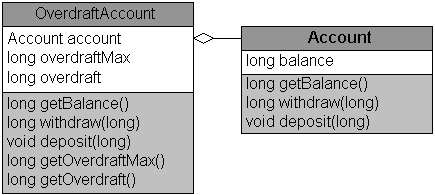
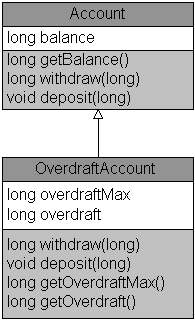
1 package com.artima.examples.account.ex2;
2
3 /**
4 * Represents a bank account with overdraft protection. Instances
5 * of this class are instantiated with a specified maximum
6 * overdraft. If a client attempts to withdraw more than the
7 * current account balance, the bank may loan the amount in
8 * excess of the balance to the client. The overdraft maximum
9 * passed to an <code>OverdraftAccount</code>'s constructor
10 * is the maximum amount the bank will lend to the client in
11 * this manner. When a client makes a deposit, the bank will
12 * pay itself back first before increasing the account's balance.
13 *
14 * <p>
15 * Money is stored in this account in integral units. Clients
16 * can use this account to store any kind of value, such as money
17 * or points, etc. The meaning of the integral units stored in
18 * this account is a decision of the client that instantiates the
19 * account. The maximum amount of units that can be stored as
20 * the current balance of an <code>Account</code> is Long.MAX_VALUE.
21 */
22 public class OverdraftAccount {
23
24 /**
25 * Helper back-end object
26 */
27 private Account account = new Account();
28
29 /**
30 * The maximum amount the bank will loan to the client.
31 */
32 private final long overdraftMax;
33
34 /**
35 * The current amount the bank has loaned to the client
36 * which has not yet been repaid. This must be zero to
37 * overdraftMax.
38 */
39 private long overdraft;
40
41 /**
42 * Constructs a new <code>OverdraftAccount</code> with the
43 * passed <code>overdraftMax</code>.
44 *
45 * @param overdraftMax the maximum amount the bank will loan
46 * to the client
47 */
48 public OverdraftAccount(long overdraftMax) {
49 this.overdraftMax = overdraftMax;
50 }
51
52 /**
53 * Returns the current overdraft, the amount the bank has
54 * loaned to the client that has not yet been repaid.
55 *
56 * @returns the current overdraft
57 */
58 public long getOverdraft() {
59 return overdraft;
60 }
61
62 /**
63 * Returns the overdraft maximum, the maximum amount the
64 * bank will allow the client to owe it. For each instance
65 * of <code>OverdraftAccount</code>, the overdraft maximum
66 * is constant.
67 *
68 * @returns the overdraft maximum
69 */
70 public long getOverdraftMax() {
71 return overdraftMax;
72 }
73
74 /**
75 * Gets the current balance of this <code>OverdraftAccount</code>
76 *
77 * @returns the current balance
78 */
79 public long getBalance() {
80 return account.getBalance();
81 }
82
83 /**
84 * Withdraws exactly the passed amount from the
85 * <code>Account</code>. If the passed amount is
86 * less than or equal to the current balance, all withdrawn
87 * funds will be taken from the balance, and the balance
88 * will be decremented by the passed amount. If the passed amount
89 * exceeds the current balance, the bank may loan the client the
90 * difference. The bank will make the loan only if the difference
91 * between the passed amount and the balance is less than or equal to
92 * the available overdraft. The available overdraft is equal to
93 * the current overdraft (the amount already loaned to the client and
94 * not yet repaid), subtracted from the overdraft maximum, which
95 * is passed to the constructor of any <code>OverdraftAccount</code>.
96 *
97 * <p>
98 * If the passed amount less the current balance is less than or equal
99 * to the available overdraft, the <code>withdraw</code> method returns
100 * the requested amount, sets the current balance to zero, and records
101 * the loan. Otherwise, if the passed amount less the current balance
102 * exceeds the available overdraft, the <code>withdraw</code> method throws
103 * <code>InsufficientFundsException</code>.
104 *
105 * @param amount amount to withdraw
106 * @returns amount withdrawn from the <code>Account</code>
107 * @throws InsufficientFundsException if the <code>Account</code>
108 * contains insufficient funds for the requested withdrawal
109 */
110 public long withdraw(long amount)
111 throws InsufficientFundsException {
112
113 long balance = account.getBalance();
114 if (balance >= amount) {
115
116 // Balance has sufficient funds, just take the
117 // money from the balance.
118 balance -= amount;
119 return amount;
120 }
121
122 long shortfall = amount - balance;
123 long extraAvailable = overdraftMax - overdraft;
124
125 if (shortfall > extraAvailable) {
126 throw new InsufficientFundsException(shortfall - extraAvailable);
127 }
128 overdraft += shortfall;
129 account.withdraw(amount - shortfall);
130
131 return amount;
132 }
133
134 /**
135 * Deposits exactly the passed amount into the <code>Account</code>.
136 * If the current overdraft is zero, the balance will be increased
137 * by the passed amount. Otherwise, the bank will attempt to pay
138 * off the overdraft first, before increasing the current balance
139 * by the amount remaining after the overdraft is repaid, if any.
140 *
141 * <p>
142 * For example, if the balance is 200, the overdraft is 100, and the
143 * <code>deposit</code> method is invoked with a passed <code>amount</code>
144 * of 50, the bank would use all 50 of those monetary units to pay down
145 * the overdraft. The overdraft would be reduced to 50 and the balance would
146 * remain at 200. If subsequently, the client deposits another 100 units,
147 * the bank would use 50 of those units to pay off the overdraft loan and
148 * direct the remaining 50 into the balance. The new overdraft would
149 * be 0 and the new balance would be 250.
150 *
151 * @param amount amount to deposit
152 * @throws ArithmeticException if requested deposit would cause the
153 * balance of this <code>Account</code> to exceed Long.MAX_VALUE.
154 */
155 public void deposit(long amount) {
156 if (overdraft > 0) {
157 if (amount < overdraft) {
158 overdraft -= amount;
159 }
160 else {
161 long diff = amount - overdraft;
162 overdraft = 0;
163 account.deposit(diff);
164 }
165 }
166 else {
167 account.deposit(amount);
168 }
169 }
170 }
1 package com.artima.examples.account.ex2;
2
3 /**
4 * Represents a bank account. Money is stored in this account
5 * in integral units. Clients can use this account to store
6 * any kind of value, such as money or points, etc. The meaning
7 * of the integral units stored in this account is a decision
8 * of the client that instantiates the account. The maximum
9 * amount of units that can be stored as the current balance of
10 * an <code>Account</code> is Long.MAX_VALUE.
11 */
12 public class Account {
13
14 /**
15 * The current balance
16 */
17 private long balance;
18
19 /**
20 * Withdraws exactly the passed amount from the
21 * <code>Account</code>. Subclasses must withdraw
22 * at least the passed amount, but may effectively withdraw more.
23 * For example, if a subclass includes the notion of
24 * a withrawal fee, the subclass's implementation of
25 * this method may charge that fee by decrementing it
26 * from the account at the time of withdrawal.
27 *
28 * @param amount amount to withdraw
29 * @returns amount withdrawn from the <code>Account</code>
30 * @throws InsufficientFundsException if the <code>Account</code>
31 * contains insufficient funds for the requested withdrawal
32 */
33 public long withdraw(long amount)
34 throws InsufficientFundsException {
35
36 if (amount > balance) {
37 throw new InsufficientFundsException(
38 amount - balance);
39 }
40
41 balance -= amount;
42 return amount;
43 }
44
45 /**
46 * Deposits exactly the passed amount into the <code>Account</code>.
47 * Subclasses may effectively deposit more or less than the passed
48 * amount into the <code>Account</code>. For example, if a subclass
49 * includes the notion of funds matching, the subclass implementation
50 * of this method may match some or all of the deposited amount at
51 * the time of deposit, effectively increasing the deposited amount.
52 * Or, if a subclass includes the notion of
53 * a deposit fee, the subclass's implementation of
54 * this method may charge that fee by decrementing it
55 * from the account at the time of withdrawal, effectively reducing
56 * the deposited amount.
57 *
58 * @param amount amount to deposit
59 * @throws ArithmeticException if requested deposit would cause the
60 * balance of this <code>Account</code> to exceed Long.MAX_VALUE.
61 */
62 public void deposit(long amount) {
63
64 // TO DO: Check for overflow
65 balance += amount;
66 }
67
68 /**
69 * Gets the current balance of this <code>Account</code>
70 *
71 * @returns the current balance
72 */
73 public long getBalance() {
74 return balance;
75 }
76 }
77

extends keyword to indicate inheritance:
class Account {
//...
}
class OverdraftAccount extends Account {
//...
}
class MoneyMarketAccount extends Account {
//...
}
java.lang.Object:
// "extends Object" is optional
class Account extends Object {
//...
}
OverdraftAccount for Account)
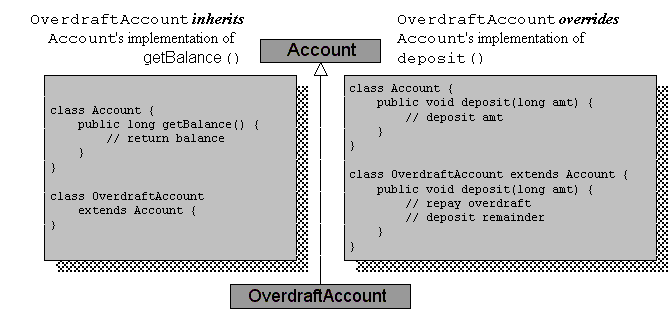
super reference
1 package com.artima.examples.account.ex1;
2
3 /**
4 * Represents a bank account. Money is stored in this account
5 * in integral units. Clients can use this account to store
6 * any kind of value, such as money or points, etc. The meaning
7 * of the integral units stored in this account is a decision
8 * of the client that instantiates the account. The maximum
9 * amount of units that can be stored as the current balance of
10 * an <code>Account</code> is Long.MAX_VALUE.
11 */
12 public class Account {
13
14 /**
15 * The current balance
16 */
17 private long balance;
18
19 /**
20 * Withdraws exactly the passed amount from the
21 * <code>Account</code>. Subclasses must withdraw
22 * at least the passed amount, but may effectively withdraw more.
23 * For example, if a subclass includes the notion of
24 * a withrawal fee, the subclass's implementation of
25 * this method may charge that fee by decrementing it
26 * from the account at the time of withdrawal.
27 *
28 * @param amount amount to withdraw
29 * @returns amount withdrawn from the <code>Account</code>
30 * @throws InsufficientFundsException if the <code>Account</code>
31 * contains insufficient funds for the requested withdrawal
32 */
33 public long withdraw(long amount)
34 throws InsufficientFundsException {
35
36 if (amount > balance) {
37 throw new InsufficientFundsException(
38 amount - balance);
39 }
40
41 balance -= amount;
42 return amount;
43 }
44
45 /**
46 * Deposits exactly the passed amount into the <code>Account</code>.
47 * Subclasses may effectively deposit more or less than the passed
48 * amount into the <code>Account</code>. For example, if a subclass
49 * includes the notion of funds matching, the subclass implementation
50 * of this method may match some or all of the deposited amount at
51 * the time of deposit, effectively increasing the deposited amount.
52 * Or, if a subclass includes the notion of
53 * a deposit fee, the subclass's implementation of
54 * this method may charge that fee by decrementing it
55 * from the account at the time of withdrawal, effectively reducing
56 * the deposited amount.
57 *
58 * @param amount amount to deposit
59 * @throws ArithmeticException if requested deposit would cause the
60 * balance of this <code>Account</code> to exceed Long.MAX_VALUE.
61 */
62 public void deposit(long amount) {
63
64 // TO DO: Check for overflow
65 balance += amount;
66 }
67
68 /**
69 * Gets the current balance of this <code>Account</code>
70 *
71 * @returns the current balance
72 */
73 public long getBalance() {
74 return balance;
75 }
76 }
77
1 package com.artima.examples.account.ex1;
2
3 /**
4 * Represents a bank account with overdraft protection. Instances
5 * of this class are instantiated with a specified maximum
6 * overdraft. If a client attempts to withdraw more than the
7 * current account balance, the bank may loan the amount in
8 * excess of the balance to the client. The overdraft maximum
9 * passed to an <code>OverdraftAccount</code>'s constructor
10 * is the maximum amount the bank will lend to the client in
11 * this manner. When a client makes a deposit, the bank will
12 * pay itself back first before increasing the account's balance.
13 *
14 * <p>
15 * As described in class <code>Account</code>, money is stored in
16 * this account in integral units. Clients
17 * can use this account to store any kind of value, such as money
18 * or points, etc. The meaning of the integral units stored in
19 * this account is a decision of the client that instantiates the
20 * account. The maximum amount of units that can be stored as
21 * the current balance of an <code>Account</code> is Long.MAX_VALUE.
22 */
23 public class OverdraftAccount extends Account {
24
25 /**
26 * The maximum amount the bank will loan to the client.
27 */
28 private final long overdraftMax;
29
30 /**
31 * The current amount the bank has loaned to the client
32 * which has not yet been repaid. This must be zero to
33 * overdraftMax.
34 */
35 private long overdraft;
36
37 /**
38 * Constructs a new <code>OverdraftAccount</code> with the
39 * passed <code>overdraftMax</code>.
40 *
41 * @param overdraftMax the maximum amount the bank will loan
42 * to the client
43 */
44 public OverdraftAccount(long overdraftMax) {
45 this.overdraftMax = overdraftMax;
46 }
47
48 /**
49 * Returns the current overdraft, the amount the bank has
50 * loaned to the client that has not yet been repaid.
51 *
52 * @returns the current overdraft
53 */
54 public long getOverdraft() {
55 return overdraft;
56 }
57
58 /**
59 * Returns the overdraft maximum, the maximum amount the
60 * bank will allow the client to owe it. For each instance
61 * of <code>OverdraftAccount</code>, the overdraft maximum
62 * is constant.
63 *
64 * @returns the overdraft maximum
65 */
66 public long getOverdraftMax() {
67 return overdraftMax;
68 }
69
70 /**
71 * Withdraws exactly the passed amount from the
72 * <code>Account</code>. If the passed amount is
73 * less than or equal to the current balance, all withdrawn
74 * funds will be taken from the balance, and the balance
75 * will be decremented by the passed amount. If the passed amount
76 * exceeds the current balance, the bank may loan the client the
77 * difference. The bank will make the loan only if the difference
78 * between the passed amount and the balance is less than or equal to
79 * the available overdraft. The available overdraft is equal to
80 * the current overdraft (the amount already loaned to the client and
81 * not yet repaid), subtracted from the overdraft maximum, which
82 * is passed to the constructor of any <code>OverdraftAccount</code>.
83 *
84 * <p>
85 * If the passed amount less the current balance is less than or equal
86 * to the available overdraft, the <code>withdraw</code> method returns
87 * the requested amount, sets the current balance to zero, and records
88 * the loan. Otherwise, if the passed amount less the current balance
89 * exceeds the available overdraft, the <code>withdraw</code> method throws
90 * <code>InsufficientFundsException</code>.
91 *
92 * @param amount amount to withdraw
93 * @returns amount withdrawn from the <code>Account</code>
94 * @throws InsufficientFundsException if the <code>Account</code>
95 * contains insufficient funds for the requested withdrawal
96 */
97 public long withdraw(long amount)
98 throws InsufficientFundsException {
99
100 long balance = getBalance();
101 if (balance >= amount) {
102
103 // Balance has sufficient funds, just take the
104 // money from the balance.
105 balance -= amount;
106 return amount;
107 }
108
109 long shortfall = amount - balance;
110 long extraAvailable = overdraftMax - overdraft;
111
112 if (shortfall > extraAvailable) {
113 throw new InsufficientFundsException(shortfall - extraAvailable);
114 }
115 overdraft += shortfall;
116 super.withdraw(amount - shortfall);
117
118 return amount;
119 }
120
121 /**
122 * Deposits exactly the passed amount into the <code>Account</code>.
123 * If the current overdraft is zero, the balance will be increased
124 * by the passed amount. Otherwise, the bank will attempt to pay
125 * off the overdraft first, before increasing the current balance
126 * by the amount remaining after the overdraft is repaid, if any.
127 *
128 * <p>
129 * For example, if the balance is 200, the overdraft is 100, and the
130 * <code>deposit</code> method is invoked with a passed <code>amount</code>
131 * of 50, the bank would use all 50 of those monetary units to pay down
132 * the overdraft. The overdraft would be reduced to 50 and the balance would
133 * remain at 200. If subsequently, the client deposits another 100 units,
134 * the bank would use 50 of those units to pay off the overdraft loan and
135 * direct the remaining 50 into the balance. The new overdraft would
136 * be 0 and the new balance would be 250.
137 *
138 * @param amount amount to deposit
139 * @throws ArithmeticException if requested deposit would cause the
140 * balance of this <code>Account</code> to exceed Long.MAX_VALUE.
141 */
142 public void deposit(long amount) {
143 if (overdraft > 0) {
144 if (amount < overdraft) {
145 overdraft -= amount;
146 }
147 else {
148 long diff = amount - overdraft;
149 overdraft = 0;
150 super.deposit(diff);
151 }
152 }
153 else {
154 super.deposit(amount);
155 }
156 }
157 }
package java.lang;
public class Object {
// Has no fields
// Has several methods, not shown...
}
class Liquid {
// Has two fields:
private int mlVolume;
private float temperature; // in Celsius
// Has several methods, not shown...
}
class Coffee extends Liquid {
// Has two fields:
private boolean swirling;
private boolean clockwise;
// Has several methods, not shown...
}
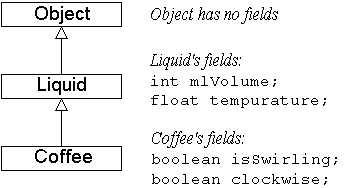
Coffee image on the heap.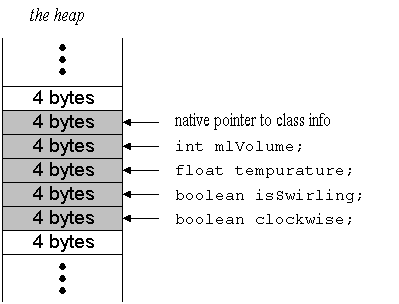
Object's fields (of which there are none)
Liquid's fields (mlVolume and
temperature)
Coffee's fields (swirling and
clockwise)
<init> methods called in bottom-up order, but instance
variables still initialized in top-down order.
super() Invocations
1 // In file compoinherit/examples/ex3/Liquid.java
2 class Liquid {
3
4 private int mlVolume;
5 private float temperature; // in Celsius
6
7 public Liquid(int mlVolume, float temperature) {
8 this.mlVolume = mlVolume;
9 this.temperature = temperature;
10 }
11
12 public float getTemperature() {
13 return temperature;
14 }
15 // Has several other methods, not shown,
16 // but doesn't include another constructor...
17 }
super() keyword with parens.
1 // In file compoinherit/examples/ex3/Coffee.java
2 public class Coffee extends Liquid {
3
4 private static final float BOILING_POINT = 100.0f; // Celsius
5 private boolean swirling;
6 private boolean clockwise;
7
8 public Coffee(int mlVolume, float temperature,
9 boolean swirling, boolean clockwise) {
10
11 super(mlVolume, temperature);
12 if (getTemperature() > BOILING_POINT) {
13 // Leave swirling at default value: false
14 return;
15 }
16 this.swirling = swirling;
17 if (swirling) {
18 this.clockwise = clockwise;
19 } // else, leave clockwise at default value: false
20 }
21 // has several methods, not shown,
22 // but doesn't override getTemperature()...
23 }
super() must be first, and there can be only one of them
per constructor.
super() from methods, just from constructors.
final Keywordfinal keyword as several meanings depending upon context.
1 public class CoffeeCup {
2
3 // Compile-time constants
4 public static final int MAX_SHORT_ML = 237;
5 public static final int MAX_TALL_ML = 355;
6 public static final int MAX_GRANDE_ML = 473;
7
8 // A run-time constant
9 public static final int favoriteNumber =
10 (int) (Math.random() * 100);
11
12 // A blank final
13 private final int size;
14
15 CoffeeCup(int size) {
16 this.size = size;
17 }
18 // ...
19 }
1 public class Example {
2
3 public static void main(String[] args) {
4 CoffeeCup cup =
5 new CoffeeCup(CoffeeCup.MAX_TALL_ML); //...
6 }
7 }
switch case statements and to do
conditional compilation with if statements.
1 public class Example {
2
3 public static void main(final String[] args) {
4
5 final int i = 12;
6 final CoffeeCup cup = new CoffeeCup(100);
7 //...
8 }
9 }
1 public class Cup {
2
3 public final void add(int amount) {
4 // ...
5 }
6 // ...
7 }
1 // THIS WON'T COMPILE
2 public class CoffeeCup extends Cup {
3
4 public void add(int amount) {
5 // ...
6 }
7 // ...
8 }
1 public final class CoffeeCup extends Cup {
2
3 // The end of the line in this
4 // branch of the family tree.
5 }
final is a severe restriction on
clients. Use it for security reasons, or as a last resort
performance tweak.
Create two classes, Shape and Circle. Have
class Circle extend class Shape. Create
a static method in class Shape called
sayHello() that prints "Nice Form!" to
the standard output. Declare a method with the same name
and signature in class Circle that prints out
"Well-rounded!" to the standard output. Create a
class named Problem1 with a main()
method that creates a Circle object and stores its
reference in a variable of type Shape. Invoke
sayHello() on the reference to the Circle
object.
Create two classes, Vehicle and Engine, with
no-arg constructors. Vehicle's constructor should print "I'm a Vehicle!" to the standard output, and Engine's
constructor should print
"I'm an Engine!". Create a new class
PickupTruck and declare it a subclass of Vehicle.
Create an instance variable in PickupTruck that is
of type Engine and initialize it (with an initializer) to a
new instance of class Engine.
Class PickupTruck should have no constructors or methods, just the
instance variable. In the main() method of
a class named Problem2, create an object of
class PickupTruck. Run the Problem2 application
and observe the results.
Create two classes, Boat and Motor, each with
one constructor that takes a single parameter of type String.
Both of these constructors should simply print the passed String
to the standard output. Create a new class
SpeedBoat and declare it a subclass of Boat.
Create an instance variable in SpeedBoat that is
of type Motor and initialize it (with an initializer) to a
new instance of class Motor. Pass the String,
"I'm a Motor!" to the Motor constructor.
Give SpeedBoat a constructor that takes a String
parameter. SpeedBoat's constructor should have only one
statement, a super() invocation that sends the passed parameter
up to the superclass constructor. When you're done, class
SpeedBoat should have only one constructor and one
instance variable. In the main() method of
a class named Problem3, create an object of
class SpeedBoat, passing in the String,
"I'm a SpeedBoat!". Run the Problem3 application
and observe the results.
Create an inheritance hierarchy of Rodent: Mouse, Gerbil,
Hamster, etc. In the base class, provide methods that are
common to all Rodents, and override these in the derived
classes to perform different behaviors depending on the
specific type of Rodents. In the main() method of a class
named Problem4, create an array of Rodent, fill
it with different specific types of Rodents, and call your
base-class methods to see what happens.
|
Sponsored Links
|